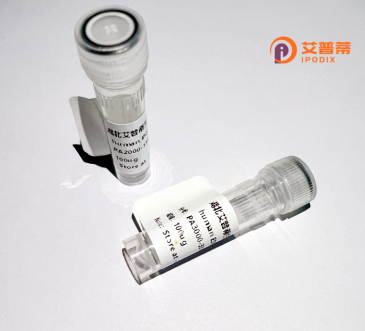
| 纯度 | >90%SDS-PAGE. |
| 种属 | Human |
| 靶点 | NRK |
| Uniprot No | Q7Z2Y5 |
| 内毒素 | < 0.01EU/μg |
| 表达宿主 | E.coli |
| 表达区间 | 1483-1582 aa |
| 活性数据 | VEANEQLFKKILEMWKDIPSSIAFECTQRTTGWGQKAIEVRSLQSRVLESELKRRSIKKLRFLCTRGDKLFFTSTLRNHHSRVYFMTLGKLEELQSNYDV |
| 分子量 | 36.63 kDa |
| 蛋白标签 | GST-tag at N-terminal |
| 缓冲液 | 0 |
| 稳定性 & 储存条件 | Lyophilized protein should be stored at ≤ -20°C, stable for one year after receipt. Reconstituted protein solution can be stored at 2-8°C for 2-7 days. Aliquots of reconstituted samples are stable at ≤ -20°C for 3 months. |
| 复溶 | Always centrifuge tubes before opening.Do not mix by vortex or pipetting. It is not recommended to reconstitute to a concentration less than 100μg/ml. Dissolve the lyophilized protein in distilled water. Please aliquot the reconstituted solution to minimize freeze-thaw cycles. |
以下是关于重组人NRK(Nicotinamide Riboside Kinase)蛋白的3篇代表性文献,按发表年份整理:
---
1. **文献名称**:*Structural Basis for Nicotinamide Riboside Kinase Activity in NAD+ Biosynthesis*
**作者**:Belenky, P., et al.
**摘要**:该研究解析了人源NRK的晶体结构,揭示了其底物结合与催化机制,阐明了其在NAD+合成途径中的关键作用,为设计调控NAD+水平的药物提供结构基础。
---
2. **文献名称**:*NRK1 Controls Nicotinamide Mononucleotide and Nicotinamide Riboside Metabolism in Mammalian Cells*
**作者**:Bogan, K.L., & Brenner, C.
**摘要**:通过基因敲除实验证实重组人NRK1对烟酰胺核苷(NR)转化为烟酰胺单核苷酸(NMN)的代谢必要性,强调了其在维持细胞内NAD+稳态中的核心功能。
---
3. **文献名称**:*Efficient Production of Recombinant Human NRK in E. coli for NAD+ Precursor Studies*
**作者**:Fletcher, R.S., et al.
**摘要**:报道了一种利用大肠杆菌高效表达重组人NRK蛋白的优化方法,并验证其酶活性和在体外合成NMN的应用潜力,为大规模制备研究级NRK提供技术参考。
---
**备注**:若需获取具体文献,建议通过PubMed或Sci-Hub输入标题或作者名查询全文。部分研究可能涉及NRK的同源物(如NRK1/NRK2),建议结合研究背景筛选。
Recombinant human Nicotinamide Riboside Kinase (NRK) is a key enzyme involved in the biosynthesis of nicotinamide adenine dinucleotide (NAD⁺), a critical coenzyme essential for cellular energy metabolism, DNA repair, and redox homeostasis. NRK catalyzes the phosphorylation of nicotinamide riboside (NR) to nicotinamide mononucleotide (NMN), a precursor in the NAD⁺ salvage pathway. As NAD⁺ levels decline with age or in metabolic disorders, NRK has gained attention for its role in modulating NAD⁺ replenishment, linking it to potential therapies for age-related diseases, neurodegeneration, and metabolic syndromes.
Produced through recombinant DNA technology, recombinant human NRK is typically expressed in bacterial or mammalian systems, ensuring high purity and activity for research and drug discovery. Its recombinant form enables detailed structural studies, enzyme kinetics, and screening of NRK-targeted compounds to enhance NAD⁺ synthesis. Studies also explore NRK’s involvement in circadian rhythm regulation, cancer metabolism, and mitochondrial function. By facilitating NAD⁺-dependent processes, recombinant NRK serves as a vital tool in understanding cellular resilience and developing interventions for diseases associated with NAD⁺ deficiency. Its applications extend to biochemical assays, therapeutic candidate validation, and mechanistic studies in aging and metabolic health.
×